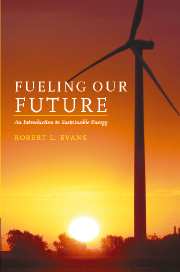Book contents
- Frontmatter
- Contents
- Preface
- Acknowledgments
- Glossary
- Part I Setting the scene
- Part II The global energy demand and supply balance
- Part III New and sustainable energy sources
- Part IV Towards a sustainable energy balance
- 9 The transportation challenge
- 10 Achieving a sustainable energy balance
- Index
- References
9 - The transportation challenge
Published online by Cambridge University Press: 05 June 2012
- Frontmatter
- Contents
- Preface
- Acknowledgments
- Glossary
- Part I Setting the scene
- Part II The global energy demand and supply balance
- Part III New and sustainable energy sources
- Part IV Towards a sustainable energy balance
- 9 The transportation challenge
- 10 Achieving a sustainable energy balance
- Index
- References
Summary
TRANSPORTATION ENERGY USE
Transportation accounts for just over a quarter of the total global demand for energy, as we have seen in Chapter 4. With increasing “globalization” and rapidly increasing wealth in countries with large populations, such as China and India, the fraction of total energy resources devoted to transportation is likely to increase in this century. Transportation energy demand can be divided between transportation primarily aimed at moving people, and that aimed primarily at moving materials and supplies, or “goods.” A further division of energy demand can also be made between the main transportation modes, i.e. travel by land, by sea, and by air. The split in global transportation energy demand by mode has been estimated by the World Energy Council (WEC), and is shown in Figure 9.1 (World Energy Council, 2005). These data include transportation of both goods and people worldwide in the year 1995. Almost 80% of the total demand for transportation results from road transport, with just under 50% of the total demand being used to provide personal transportation in light-duty vehicles. The remaining 20% of total transportation demand is split nearly equally between the air, rail, and marine transportation modes. Nearly all of the energy used for transportation is derived from crude oil in the form of gasoline and diesel fuel for road transport, jet fuel for air travel, and diesel fuel and heavy bunker oil for marine transportation.
- Type
- Chapter
- Information
- Fueling Our Future: An Introduction to Sustainable Energy , pp. 141 - 164Publisher: Cambridge University PressPrint publication year: 2007



